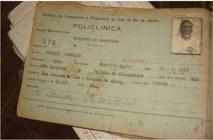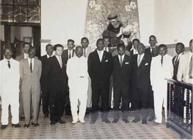This article explores whether and how signs of an Afro-Brazilian experience surfaced during the life of SCEC, a trade union of coffee carriers and packers (carregadores e ensacadores de café) that flourished in the port of Rio de Janeiro between 1931 and 1964. In spite of the large presence of Afro-descendant workers at SCEC, black legacy was largely absent in the official discourse of the trade union, which gave emphasis instead to class, nationalism and other color-blind values. This fact is not completely disconnected from the socio-political context of Brazil in that epoch, dominated by the system of labor politics (trabalhismo) and the ideology of racial democracy. However, I point out that markers of a 'black field' were not completely alien to SCEC. They still survive in the memories of ensacadores, and are reflected in the racial patterns that have traditionally characterized the docklands of Rio de Janeiro.
post-abolition; trade unions; black identity

 Thumbnail
Thumbnail
 Thumbnail
Thumbnail
 Thumbnail
Thumbnail
 Thumbnail
Thumbnail
 Thumbnail
Thumbnail
 Thumbnail
Thumbnail
 Thumbnail
Thumbnail
 Thumbnail
Thumbnail
 Thumbnail
Thumbnail








